Select indicator
 Women and girls enjoy the right to a life free of violence
Women and girls enjoy the right to a life free of violence
Violence against women - particularly intimate partner violence and sexual violence - are major public health problems and violate women's rights. Global estimates indicate that about 1 in 3 women worldwide have experienced physical or sexual violence, most of which is intimate partner violence. Civil society organisations, which are aware of the local context, play an important role in addressing this situation by providing shelter and helping victims, advocating for government action, educating and raising awareness in communities and supporting men in changing their attitudes and behaviour.
Number of civil society organisations with strengthened competencies and capacity for effective action
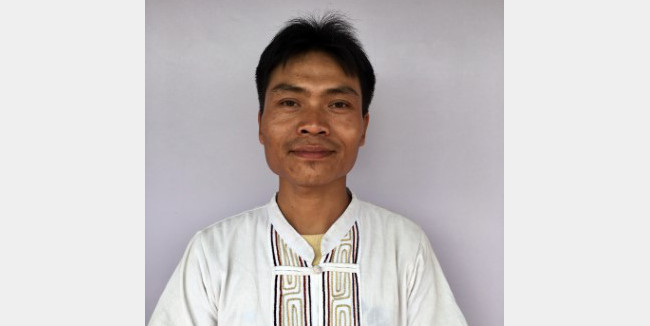
Activist against gender-based violence, Myanmar.
What does this indicator mean?
Elimination of violence against women and girls requires the commitment of the police, doctors and teachers but most of all husbands, fathers, brothers and sons. Civil society organisations are part and parcel of any strategy to create a world in which women and girls can enjoy the right to a life free from violence. Strengthening their capacity is central to Dutch policy in relation to women’s rights and gender equality.
What does the result mean?
In 2016, the Netherlands supported 113 women’s rights organisations in improving their capacity and skills to deal with the complex and sensitive issue of gender-based violence. In addition to providing shelter to victims, the majority work with the health care sector and the police to improve their knowledge and quality of services. Some focus on teaching women about their rights while others focus exclusively on men and boys. A project in Bolivia, for example, invited artists from all over greater La Paz to paint murals condemning violence against women and girls.
 Women and girls enjoy the right to a life free of violence
Women and girls enjoy the right to a life free of violence
Violence against women - particularly intimate partner violence and sexual violence - are major public health problems and violate women's rights. Global estimates indicate that about 1 in 3 women worldwide have experienced physical or sexual violence, most of which is intimate partner violence. Civil society organisations, which are aware of the local context, play an important role in addressing this situation by providing shelter and helping victims, advocating for government action, educating and raising awareness in communities and supporting men in changing their attitudes and behaviour.
Improved preconditions for the elimination of violence against women and girls
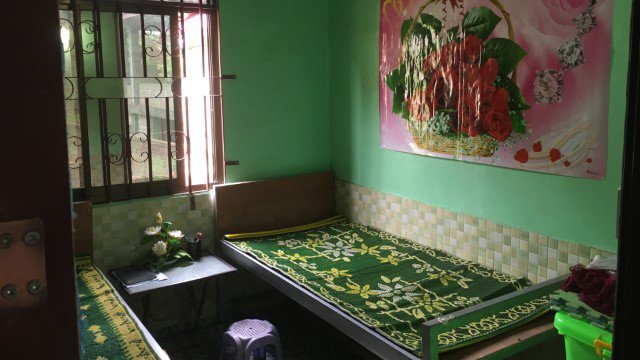
A women’s shelter in Myanmar
What does this indicator mean?
Violence against women and girls is an issue that needs to be addressed at three levels: legislation and policies, regulations and enforcement, and communities and society at large, where norms and practices condone and perpetuate this social injustice. In addition, violence against women and girls is surrounded by taboos, to a degree that makes it impossible to accurately measure the magnitude of the problem. This, in turn, hinders the design of effective policies.
What does the result mean?
In Mozambique, women's rights organisations have helped the government to design measures to prevent child marriage and remove discriminatory provisions in family law. In Afghanistan, Ghana, Myanmar, Pakistan and Rwanda, women’s rights organisations are active in raising awareness, providing services and lobbying for effective legislation. In Bolivia, civil society organisations working together successfully pushed for penalisation of gender-based violence. One project in the Democratic Republic of Congo supported an indigenous group in having their marital unions registered, which improved the situation for women’s rights. With support from the Netherlands, among others, UN Women is leading a global programme to increase the availability and quality of data on violence against women.
 Women exercise power and leadership
Women exercise power and leadership
Gender equality also means that women are involved in running the world. Without their effective participation in decisions on international, national and local affairs, their needs and interests, as well as those of future generations, will not receive the attention they are due, nor a fair share of resources.
Number of civil society organisations with strengthened competencies and capacity for effective action
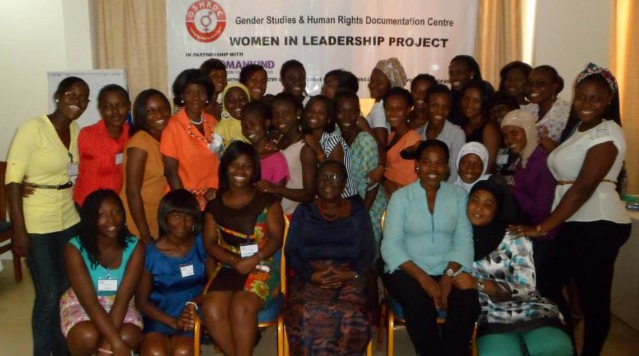
Women in leadership training, Ghana
What does this indicator mean?
Women who aspire to a position in politics and government, especially if it is on a women’s rights ticket, have to be prepared for resistance, misogyny, threats and physical violence. They also often have to do without the support of established political parties. This is where civil society organisations are indispensable. They offer skills training and provide a support base and environment for constructive feedback to women politicians, thus contributing to their political effectiveness. Presently, there is a vast gap in knowledge on women’s political representation and leadership at the local level. UN Women has started work to monitor this.
What does the result mean?
A total of 75 civil society organisations dedicated to increasing women’s representation in local politics received Dutch support. They trained candidates in communication skills and campaigning strategies with positive outcomes in eight countries across Asia, Africa and Latin America. As a result, the number of female candidates and the number of women elected increased.
 Women exercise power and leadership
Women exercise power and leadership
Gender equality also means that women are involved in running the world. Without their effective participation in decisions on international, national and local affairs, their needs and interests, as well as those of future generations, will not receive the attention they are due, nor a fair share of resources.
Improved preconditions for women's presence in positions of influence

Woman speaks at village assembly in Rajasthan
What does this indicator mean?
To monitor progress, the Netherlands tracks the changes required to allow women to participate in political processes and compete for leadership positions on an equal footing with men. In the reporting period, 44 such changes were observed, for instance the amendment of local election law and the introduction of quota systems. Being structural in nature, such measure remove obstacles for women. The observed changes, described on the right, are partly attributable to the support extended by the Netherlands.
What does the result mean?
In Myanmar, for the first time, four civil society networks engaged progressive women parliamentarians in discussions on the subject of state responsibilities for women’s rights. East Timor saw a twenty-fold increase in women candidates for local elections, thanks to changes in local election law. In Bangladesh, women leaders from eleven indigenous groups, along with local politicians and journalists, were educated on governance systems and empowered to navigate political processes more skilfully and confidently. In Zambia, a 24-year old woman beat her 13 male opponents in council elections. UN Women contributed technical support for legal reform in favour of women’s rights in 61 countries.
 Women are empowered as economic actors
Women are empowered as economic actors
Women largely contribute to the global economy but, compared to men, they are at a disadvantage in terms of wages, job security, career opportunities, access to training, technology, assets and capital, and last but not least, the considerable burden of unpaid care work. This is especially true for rural women, who spend a disproportionate amount of time fetching water or firewood and processing and preparing food.
Number of civil society organisations with strengthened competencies and capacity for effective action
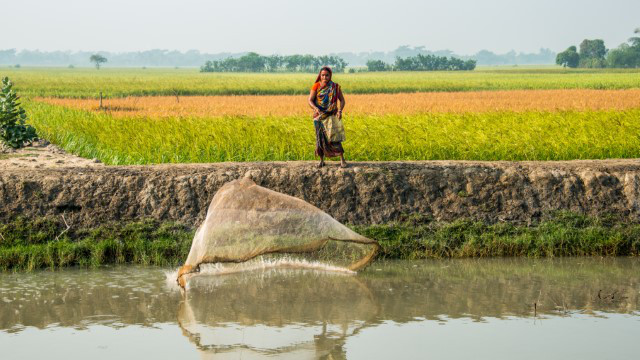
What does this indicator mean?
Civil society organisations work for women’s equal access to economic opportunities and resources. They do this by advocating for improved working conditions, facilitating access to markets, technology and credit and supporting the formation of producers’ associations and co-operatives. To a large degree, women’s economic empowerment also depends on awareness, at household and community level, of the unfair distribution of unpaid care work.
What does the result mean?
With Dutch support, 68 civil society organisations are working for the economic empowerment of women at grassroots level. In addition to the technical aspects of income-earning activities, they teach women about their rights and help them to access markets, training or credit. Other civil society organisations work with private sector employers to improve labour conditions for women, including addressing sexual harassment and violence on the shop floor.
 Women are empowered as economic actors
Women are empowered as economic actors
Women largely contribute to the global economy but, compared to men, they are at a disadvantage in terms of wages, job security, career opportunities, access to training, technology, assets and capital, and last but not least, the considerable burden of unpaid care work. This is especially true for rural women, who spend a disproportionate amount of time fetching water or firewood and processing and preparing food.
Improved preconditions for women's economic empowerment
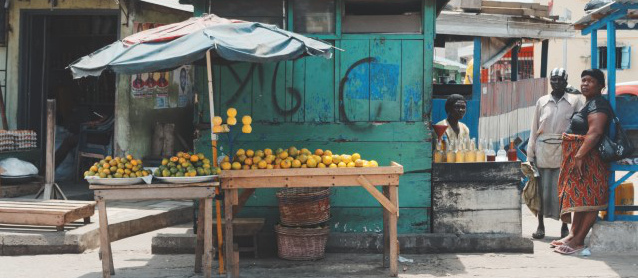
Juice stall in Accra, Ghana
What does this indicator mean?
The engagement of local authorities, public- and private-sector service providers and employers is key to creating an environment in which women can earn a decent living and fulfil their economic potential. Through advocacy, training and collaboration arrangements, civil society organisations help to remove obstacles and bring about the structural changes necessary for women to access their fair share of resources and services.
What does the result mean?
Funding Leadership and Opportunities for Women (FLOW), the Dutch flagship programme for women’s rights and gender equality, was launched on 1 January 2016. FLOW has started to work on economic empowerment with approx. 25,000 women across more than 10 countries in Asia and Africa. In Vietnam, the programme is assisting 5,000 women rice farmers to improve their cultivation techniques. In Bangladesh, Pakistan, Ghana and Rwanda, FLOW has supported some 20,000 women farmers to form groups. This programme is helping them to obtain land titles, form market associations and assume leadership roles in the local community. The programme collaborates with local government to introduce measures that alleviate women’s burden of unpaid care work.
 Women are meaningfully involved in the prevention and resolution of conflict and the shaping of post-conflict society
Women are meaningfully involved in the prevention and resolution of conflict and the shaping of post-conflict society
Peace negotiations that exclude women will not achieve complete and lasting peace. The vital role that women play in conflict situations is often unrecognised and under-valued. More than anyone else, women know that conflict robs communities of the fabric that holds them together. The Netherlands is an active supporter of UN Security Council Resolution 1325 on Women, Peace and Security. This resolution is concerned with the prevention of sexual violence during conflict, both by combatants and peacekeepers, and with the involvement of women in peace negotiations and in reconstruction.
Number of civil society organisations with strengthened competencies and capacity for effective action
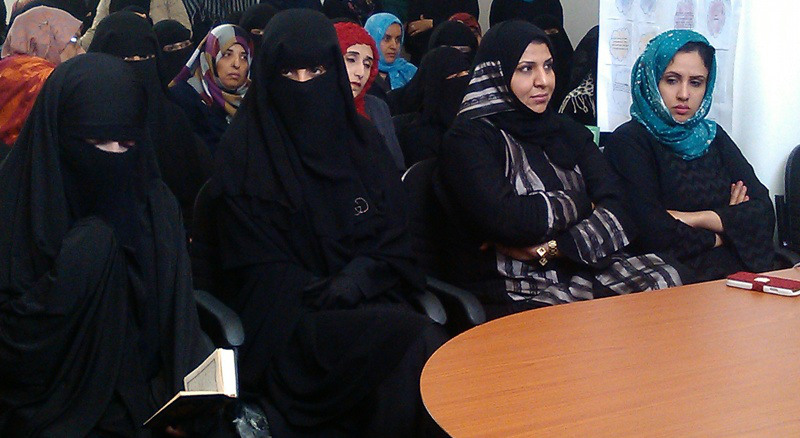
Nabeela reading from the Quran at the opening of a Yemeni women's leadership training
What does this indicator mean?
Women’s participation in peace negotiations and processes that shape the future of post-conflict society make the outcome fairer and more inclusive. By strengthening civil society organisations, the Netherlands supports their local peace-building work and promotes their participation in formal peace negotiations. Reports show that women are capable of reaching out to representatives of different political and religious denominations and ethnic groups, and that they are willing to compromise for the sake of peace.
What does the result mean?
Together with UN Women, the Netherlands supported the work of the Yemeni Women’s Pact by facilitating dialogue and meetings with the UN Secretary General's Special Envoy for Yemen.
In Afghanistan and Iraq, by working together, civil society organisations are creating stronger platforms to advocate for inclusive and sustainable peace.
In 2016, the Netherlands launched its third national action plan for the implementation of UN Security Council Resolution 1325. This plan expresses the joint commitment by the government, civil society and academia to accelerate implementation of the resolution.
 Women are meaningfully involved in the prevention and resolution of conflict and the shaping of post-conflict society
Women are meaningfully involved in the prevention and resolution of conflict and the shaping of post-conflict society
Peace negotiations that exclude women will not achieve complete and lasting peace. The vital role that women play in conflict situations is often unrecognised and under-valued. More than anyone else, women know that conflict robs communities of the fabric that holds them together. The Netherlands is an active supporter of UN Security Council Resolution 1325 on Women, Peace and Security. This resolution is concerned with the prevention of sexual violence during conflict, both by combatants and peacekeepers, and with the involvement of women in peace negotiations and in reconstruction.
Improved preconditions for women's meaningful participation in conflict resolution and the shaping of post-conflict society

Peacekeeper in the Democratic Republic of Congo
What does this indicator mean?
Women’s human rights are part and parcel of inclusive and sustainable peace. Protecting and upholding these rights implies that women’s rights are incorporated in the constitution and that the provision of services, such as security, health care and education, is compliant with the new law. This may require considerable investments in the recruiting and training of staff. The Netherlands helps to improve the preconditions for inclusive peace and security. Recognition of women’s role in peace and reconstruction processes is growing but at a very slow pace. Every structural measure is a step in the right direction.
What does the result mean?
In Afghanistan, the Netherlands contributed to a marked increase in the number of women in the police force, along with an improvement in labour conditions, such as scholarships, separate washrooms and a complaint mechanism. The presence of women makes it easier for victims of (sexual) violence to file a complaint. Following a training course, 140 military and civilian peacekeepers now know how to recognise, help prevent and support the victims of sexual violence. In addition, the Netherlands has seconded senior gender experts to the peacekeeping missions in the DRC and Mali.





